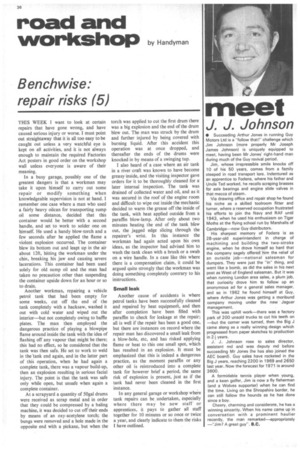Benchwise: repair risks (5)
Page 38

If you've noticed an error in this article please click here to report it so we can fix it.
THIS WEEK I want to look at certain repairs that have gone wrong, and have caused serious injury or worse. I must point out straightaway that it is all too easy to be caught out unless a very watchful eye is kept on all activities, and it is not always enough to maintain the required Factories Act posters in good order on the workshop wall unless everyone is aware of their meaning.
In a busy garage, possibly one of the greatest dangers is that a workman may take it upon himself to carry out some repair or modify something when knowledgeable supervision is not at hand. I remember one case where a man who used a fairly heavy oilcan for transporting sump oil some distance, decided that this container would be better with a second handle, and set to work to solder one on himself. He used a handy blow-torch and a few seconds after he applied the flame a violent explosion occurred. The container blew its bottom out and leapt up in the air about 12ft, hitting the workman under the chin, breaking his jaw and causing severe lacerations. This container had been used solely for old sump oil and the man had taken no precaution other than suspending the container upside down for an hour or so to drain.
Another workman, repairing a vehicle petrol tank that had been empty for some weeks, cut off the end of the tank completely with a hacksaw, washed it out with cold water and wiped out the interior—but not completely owing to baffle plates. The man then employed the dangerous practice of playing a blowpipe flame around inside the tank with the idea of flashing off any vapour that might be there; this had no effect, so he considered that the tank was then safe. He set to work to weld in the "tank end again, and in the latter part of thii operation, when he had again a complete tank, there was a vapour build-up, then an explosion resulting in serious facial injury. The point is that the tank was safe only while open, but unsafe when again a complete container.
At a scrapyard a quantity of 50gal drums were received as scrap metal and in order that they could be compressed by a baling machine, it was decided to cut off their ends by means of an oxy-acetylene torch; the bungs were removed and a hole made in the opposite end with a pickaxe, but when the torch was applied to cut the first drum there was a big explosion and the end of the drum blew out. The man was struck by the drum and further injured by being covered with burning liquid. After this accident this operation was at once dropped, and thereafter the ends of the drums were knocked in by means of a swinging tup.
I also heard of a case where an air tank in a river craft was known to have become greasy inside, and the visiting inspector gave orders for it to be thoroughly cleaned for a later internal inspection. The tank was drained of collected water and oil, and as it was secured in the roof of the engine room and difficult to wipe out inside the mechanic decided to warm the grease off the inside of the tank, with heat applied outside from a paraffin blow-lamp. After only about two minutes heating the end of the tank blew out, the jagged edge slicing through the repairer's wrist. In this instance the workman had again acted upon his own ideas, as the inspector had advised him to wash the tank clean with a brush or a swab on a wire handle. In a case like this where there is a compensation claim, it could be argued quite strongly that the workman was doing something completely contrary to his instructions.
Small leak Another cause of accidents is where petrol tanks have been successfully cleaned and repaired by heat equipmenit, and then after completion have been filled with paraffin to check for leakage at the repair; all is well if the repair has been a good one, but there are instances on record where the repair man has discovered a small leak from a blow-hole, etc, and has risked applying flame or heat to this one small spot, which has resulted in an explosion. It must be emphasized that this is indeed a dangerous practice, as the moment paraffin or any other oil is reintroduced into a complete tank for however brief a period, the same risk of explosion is present, just as if the tank had never been cleaned in the first instance.
In any general garage or workshop where tank repairs can be undertaken, especially where there may be new staff or apprentices, it pays to gather all staff together for 10 minutes or so once or twice a year, and clearly indicate to them the risks I have outlined.




























































































